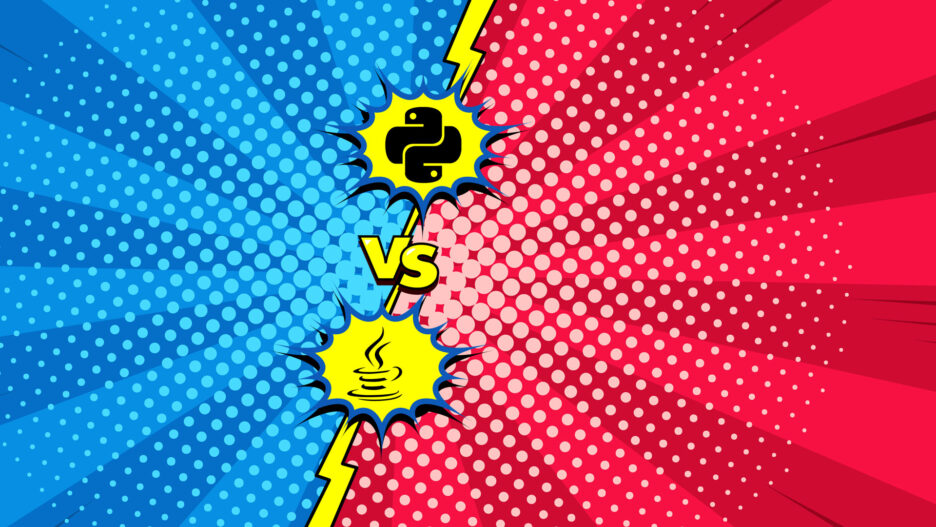Choosing the right tool for a particular job is very important. Equally important is the choice of programming language and framework for executing an IT project. Java and Python are very similar, but some specific properties make them different. However, both languages are popular and will continue to be in demand in the future.
These programming languages have a huge community, a very good knowledge base for programming tips, a lot of useful literature for beginner to expert level.
Both languages continue to actively develop and new versions regularly go out into the world for practical use. As they evolve, not only are the syntax and semantics of the languages developed, but also the corresponding infrastructures and frameworks.
Brief history
Python was created by Guido van Rossum and first released in 1991. Guido van Rossum started to work on the project in 1989 at Centrum Wiskunde & Informatica in the Netherlands. About 30 years later, Python became the most popular programming language which supports procedural, object-oriented, and functional programming.
Java was created by James Gosling at Sun Microsystems in 1995 and acquired by Oracle. James Gosling was one of the first to bring the idea of a virtual machine to practical application. The greatest achievement of Java is the concept of the virtual machine with bytecode, which gave us the possibility of "write once, run anywhere".
Python or Java closer look
Syntax
There is no exact definition of a better programming language syntax. The syntax of the programming language depends on the task that is being solved at the moment. Therefore, the discussion about the better syntax between Java or Python is meaningless. Either language will be effective where it is more appropriate.
Syntax of Python is more compact and self-descriptive. Please take a look at this example, it is really compact and clear:
thislist = ["apple", "banana", "cherry"]
for x in thislist:
print(x)Code language: PHP (php)Syntax of Java is more detailed, classical and very well adapted for object-oriented programming. Here is an example of Java code:
import java.util.HashMap;
import java.util.Map;
public class IterateHashMap {
public static void main(String[] args) {
Map<String, String> map = new HashMap<String, String>();
map.put("key1", "value1");
map.put("key2", "value2");
map.forEach((key,value)->System.out.println(key+ " = " + value));
}
}Code language: JavaScript (javascript)Data Types
Basic data types in Python are integers, float-point numbers, complex numbers, strings, and boolean and built-in functions for math, conversions, iterations, input/output, etc. are provided.
Primitive data types in Java are byte, short, int, long, float, double, boolean and char. Also, Java supports non-primitive data types - such as String, Arrays, and Classes.
The main difference, in this case, is that Python supports dynamic types and Java supports static types. For specific tasks dynamic type has a big advantage and for large complex systems, static type is preferable.
Object-Oriented Programming
Python and Java support fundamental object-oriented paradigms:
- Inheritance
- Encapsulation
- Abstraction
- Polymorphism
Both Python and Java have access modifiers in classes public, private and protected.
Java code can be organized as classes in object-oriented form, Python supports both OOP and also a procedural form of simple commands flow.
Runtime Speed
With regard to runtime speed, Java is a winner compared to Python. More information can be found in this project.
But, Python can use high-performance libraries like numpy, opencv, and tensorflow where the speed will be the same as Java and C++.
Very often Python is useful for solving tasks where computing performance is not critical.
Garbage collectors
Python counts references to allocated objects and free memory if data is not used by the garbage collector.
In Java, memory is allocated for objects only. Then JRT supports an effective garbage collector for objects allocated in memory.
Lambda
A lambda expression is a block of code that is treated as an object.
Python supports lambda function. For example:
x = lambda a : a * 2This code will return value multiplied by 2, in this case, 4.
From JDK 8 Java supports lambda expressions. For example:
a -> 2 * aBoth Python and Java work great with lambda expressions.
Exception handling
Python has unified operators for exception handling, such as try/except/finally. It is highly recommended to use them for input/output operations, calculations, working with libraries, calls, etc. Please find an example in Python documentation:
try:
block-1 ...
except Exception1:
handler-1 ...
except Exception2:
handler-2 ...
else:
else-block
finally:
final-blockCode language: PHP (php)Java has try/catch/finally exception handling operators, so it helps to solve many problems with running code. This is an example from W3school:
public class MyClass {
public static void main(String[] args) {
try {
int[] myNumbers = {1, 2, 3};
System.out.println(myNumbers[10]);
} catch (Exception e) {
System.out.println("Something went wrong.");
} finally {
System.out.println("The 'try catch' is finished.");
}
}
}Code language: PHP (php)Coding Conventions
Coding conventions are a set of rules and agreements on the design of the code and the style of writing programs, the unification of technical solutions in programming. The coding convention helps make the code the same throughout the project, regardless of the time of the development or the author of the code. This makes the code easy to read and understand for all project participants.
Python has a great style guide, known as PEP8. Java has great coding conventions from Oracle. Many companies have their own coding conventions adopted for specific needs and corporate culture. Coding conventions, together with the documenting system (Pydoc and Javadoc accordingly), promote keeping the code at the necessary level of quality.
Unit testing
Python and Java both have very good integration with the unit testing system.
Python has a testing framework, unit test, that has become standard. This allows creating effective unit tests with minimum time. This framework has all kinds of assets to make unit tests accurate.
Java has a testing framework, JUnit, that is accepted as the standard for Java applications. This framework is very well integrated with IDE and other tools such as continuous integration systems.
Installing new libraries
Python has very good support for installing new libraries with the pip tool. For instance, to install the numpy library simple type command:
pip install numpyInstalling a new library in Java depends on using IDE (NetBeans, Eclipse, etc). or add it to Java classpath.
Frameworks availability (web, game development, AI, ML, data science, mobile dev)
Python as a programming language itself is one of the many, but its numerous frameworks and libraries make it really a magic solution. It includes very popular web frameworks like Django, Flask, Bottle. Numerical and mathematical frameworks such as numpy let Python solve any task in numerical methods. Very notable frameworks for machine learning and neural networks make Python an almost ideal environment for data scientists (Tensorflow, Keras). OpenCV with Python allows working with images and computer vision. Python Robotics (PyRo) creates a great opportunity for Python in programming robots. PyGame allows developing game software. Mobile cross-platform frameworks (Kivy – Cross-platform Python GUIs, The BeeWare Project – Native Python Mobile Apps) covers needs in the area of mobile development. Jupyter Notebook makes the working process with Python consistent and comfortable. A comprehensive list of Python frameworks is available here.
Java has very good frameworks in all areas of IT. Java provides Java Standard Edition, Java Cards for smart cards, Java Micro Edition, and Java Enterprise edition. Users can select between virtual machine from Oracle or open source OpenJDK. Frameworks support all specters of solutions, from web development (Apache Struts, Google Widget Toolkit, JBoss), distributed computation (Apache Storm, Apache Hadoop), numerical computation (Ejml), mobile platform (Android SDK), etc. A comprehensive list of Java frameworks is available here.
Both Java and Python have great integration with cloud solutions, including Platform as a Service (PaaS). For instance, Google Cloud, Heroku, and Azure support Java and Python as valuable programming languages for PaaS.
Should I learn Java or Python?
Python and Java both have very strong futures and developers with knowledge and experience in them will always have an interesting and well-paid job. If you are deciding ‘should I learn Java or Python’, here is a simple roadmap (do not consider it as dogma):
- Start with Python
- Learn Java
- Be expert in both systems
- Listen to your inner voice to decide which language you like best
Another consideration is that Python is a great option for domain area specialists, who don’t have primary jobs as software developers.
Java is a great option for software engineers and software developers for the implementation of large scale information systems.
Takeaways
In general, Java is a programming language for corporate level software, high-performance backend, and large information systems. It also works great on the mobile platform (i.e. Android).
Python is a proper choice for scripting, web projects, machine learning, AI, computer vision, DevOps, etc.
In a dispute of Python vs Java, as a first programming language, it is recommended to learn Python. Then you can start to learn Java with all its advantages of high-class object-oriented systems, static types, and advanced syntax.
Svitla Systems has an excellent background in solutions based on either Python or Java. Our experts create new projects for customers using the most appropriate language and support existing solutions in Python or Java.





